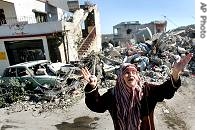2006年VOA标准英语-Lebanese Return Home to South As Cease-fire Tak(在线收听)
By Challiss McDonough
Yatar, Lebanon
14 August 2006
After a month of fighting in Lebanon, a U.N.-mediated cease-fire has taken hold between Israel and Hezbollah militants. Thousands of people are streaming back to their homes, despite government warnings that it is not yet safe. VOA Correspondent Challiss McDonough reports from the southern village of Yatar.
---------
 Lebanese woman reacts to the destruction in the heavily-bombed town of Aita Ech Chaab, near the Israeli border |
||
As silence fell, the first cars started venturing onto the battered roads. People began making their way back home, to see if they had houses to return to.
Outside of Qana, Rahaji Mohamad Kefil and her family were stuck in traffic, waiting for two bulldozers to clear the remains of a bombed building off of the road.
She says, "We are going home, but we do not know if our homes are there. We fled the shelling, but as soon as there was a cease-fire, we headed back."
The Lebanese government warned people not to try to return home because of the danger of unexploded ordnance, and the danger that the cease-fire might not hold. But they came by the thousands anyway, with foam mattresses strapped to the roofs of their cars and children crammed into the back seats.
And families were not the only ones returning.
An hour and a half after the cease-fire took hold, a group of Hezbollah fighters was seen emerging from a hideout, about 12 kilometers from the Israeli border. They wore their uniforms, and openly carried weapons and ammunition.
From their demeanor, it was clear that they view the cease-fire as a victory.
The militants refused to be interviewed, but peppered a pair of journalists with questions about what they and the people of the West think about the war.
Two hours later and further east, another group of militants in the village of Yatar had already changed into civilian clothes, but were still carrying their signature two-way radios. They embraced each other like long-lost brothers.
One man walked up, still carrying his AK-47. Seeing a group of journalists, he pulled his T-shirt over the weapon, trying to hide it. He disappeared into a nearby building, and came back a few minutes later, unarmed.
And, so the militants are melting back into the population. Local residents have said since the beginning that Israel's goal of pushing Hezbollah away from the border was unattainable.
Israel has accused Hezbollah of hiding behind civilians, but residents say the group is an integral part of the Shi'ite community in south Lebanon, not just a militia.
As if to illustrate that point, three women emerged from somewhere in the ruined town and began shouting and chanting their support for Hezbollah.
They dug Hezbollah flags and pictures of the group's leader from the rubble, and waved them for television cameras, as an interpreter explained what they were shouting.
"If they come back and try this again, let them know that we will be victorious over the Israelis," she said. "We will be victorious, and we will exterminate them, just like they tried to exterminate us, from this free land where they tried to exterminate us. If they try it again, we will be victorious, and we will exterminate them."
But standing on the steps of a nearby building, the deputy mayor of the town, Abu Ali Suweidan, rebuked the women's display of fervor.
"Tell that woman to shut her mouth up," he said. "We do not need any more talk like this."
His words are a sign that the rhetoric of war is changing to pragmatism, as the cease-fire takes hold.
For more than a month, the people of southern Lebanon have repeated the same word - steadfast. They vowed not to give up in the face of Israeli bombardment, and - in public, at least - pledged their loyalty to Hezbollah, which has long been the de facto authority in south Lebanon. Israel began its bombardment after Hezbollah, which the State Department has designated terrorist group, captured two Israeli soldiers. The group has fired hundreds of rockets into the Jewish state from southern Lebanon.
"We hope this is the last war, and we hope the Lebanese government can extend its authority to all of Lebanon," said Abu Ali Suweidan. "That, he says, is what I am praying for."
He sat with his arm draped over the shoulder of a Hezbollah militant, but his words reflected the wording of the long-awaited cease-fire resolution, approved by the United Nations three days earlier.
Around him, his village lay in ruins. Building after building has been flattened beyond recognition. There is a gaping hole in the wall of the local mosque. The carcass of a dead donkey lies rotting by the side of the road.
"It is very sad and painful to look at my village and see all of this. I look at the enemy," he said, referring to Israel, "and I see that they probably think they have done something great."